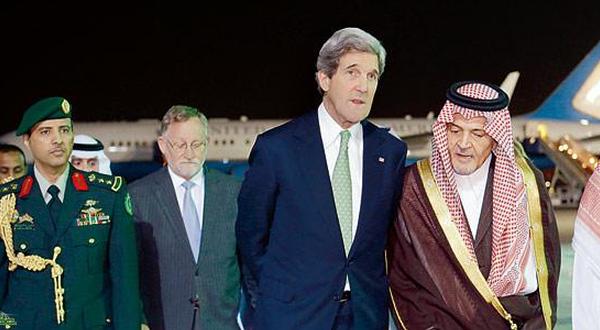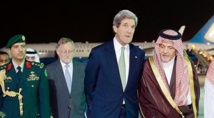Saudi Arabia, locked in a decades-long rivalry with Iran, is concerned that proposed Syrian peace talks could leave a Tehran-backed regime in Damascus and that a breakthrough in nuclear negotiations could lead to a US rapprochement with Iran.
The conservative oil-rich kingdom has grown increasingly nervous over the past two years as popular revolts have toppled onetime allies in Egypt, Tunisia and Yemen and spread turmoil across the region.
In an unprecedented move last month, Saudi turned down a coveted non-permanent seat on the UN Security Council in protest at the world body's failure to end the war in Syria, which has left over 120,000 people dead.
Earlier Sunday in Cairo, Kerry acknowledged that while there might be differences over "tactics" in ending the Syrian conflict, the end goal for the United States and its allies was the same -- a transition of power.
Riyadh, one of the main backers of the Syrian opposition, was reportedly angered when US President Barack Obama last month put on hold threatened military strikes against Syrian President Bashar al-Assad's regime.
While acknowledging that "some countries" wanted the United States to act differently on Syria, Kerry insisted that "differences on individual tactics on policy do not mean a difference on (the) fundamental goal of the policy."
"We all share the same goal ... that is the salvation of the state of Syria and a transition government put in place ... that can give the people of Syria the opportunity to choose their future," Kerry said during a press conference with Egyptian foreign minister Nabil Fahmy.
Kerry also said the US would stick with its friends as they navigate the turmoil unleashed by the Arab Spring, which has led to the rise of powerful new extremist groups in Libya and Syria.
"We will be there for Saudi Arabia, for the Emirates, for Qataris, for the Jordanians, for the Egyptians and others. We will not allow those countries to be attacked from outside. We will stand with them," he told reporters.
'They're very clear about their concerns'
Kerry was to be greeted Sunday by Saudi Foreign Minister Saud al-Faisal and have his first meeting since becoming secretary of state in February with Saudi King Abdullah on Monday.
A State Department official said the visit would be "one more opportunity to engage on a very high level on all of the issues that we work on with Saudi Arabia."
Washington had been discussing with Riyadh the "best way to ensure support for the Syrian opposition coalition, and the military wing of the Syrian coalition," the official said.
Kerry, working with his Russian counterpart Sergei Lavrov and UN special envoy Lakhdar Brahimi, has been trying to convene peace talks in Geneva aimed at bringing in a transitional government in Syria.
Major groups in the Syrian opposition have so far refused to sit down with members of the Assad regime, insisting his resignation must be on the table, a demand rejected by Damascus.
But the United States is working to unify the opposition, and it is hoping that the so-called Geneva II talks can be held in late November.
Saudi Arabia has also eyed warily international moves to engage arch-foe Iran on its nuclear programme following the election of President Hassan Rouhani, a reputed moderate who held a landmark phone call with President Barack Obama in September.
"They're very clear about their concerns. We frankly completely agree with the Saudis about their concerns," the State Department official said.
Analysts said that while ties between the two allies are strained at the moment they are unlikely to break completely.
"The meeting is an attempt to assuage Saudi fears about a real divergence in US-Saudi relations, particularly Syria and Iran," Frederic Wehrey, senior associate in the Middle East program at the Carnegie Endowment for International Peace wrote.
"Despite the Saudi outcry, the bedrock of US and Saudi ties -- intelligence coordination and military containment of Iran -- is solid," he argued.
"The Saudis will likely demand greater consultation and communication from the US and a more forceful line on Syria. The outcome will probably produce an improvement in the tenor and style of relations but not significant policy changes from either the US or Riyadh."
------------------------------------------------------------------------------------------------------
The conservative oil-rich kingdom has grown increasingly nervous over the past two years as popular revolts have toppled onetime allies in Egypt, Tunisia and Yemen and spread turmoil across the region.
In an unprecedented move last month, Saudi turned down a coveted non-permanent seat on the UN Security Council in protest at the world body's failure to end the war in Syria, which has left over 120,000 people dead.
Earlier Sunday in Cairo, Kerry acknowledged that while there might be differences over "tactics" in ending the Syrian conflict, the end goal for the United States and its allies was the same -- a transition of power.
Riyadh, one of the main backers of the Syrian opposition, was reportedly angered when US President Barack Obama last month put on hold threatened military strikes against Syrian President Bashar al-Assad's regime.
While acknowledging that "some countries" wanted the United States to act differently on Syria, Kerry insisted that "differences on individual tactics on policy do not mean a difference on (the) fundamental goal of the policy."
"We all share the same goal ... that is the salvation of the state of Syria and a transition government put in place ... that can give the people of Syria the opportunity to choose their future," Kerry said during a press conference with Egyptian foreign minister Nabil Fahmy.
Kerry also said the US would stick with its friends as they navigate the turmoil unleashed by the Arab Spring, which has led to the rise of powerful new extremist groups in Libya and Syria.
"We will be there for Saudi Arabia, for the Emirates, for Qataris, for the Jordanians, for the Egyptians and others. We will not allow those countries to be attacked from outside. We will stand with them," he told reporters.
'They're very clear about their concerns'
Kerry was to be greeted Sunday by Saudi Foreign Minister Saud al-Faisal and have his first meeting since becoming secretary of state in February with Saudi King Abdullah on Monday.
A State Department official said the visit would be "one more opportunity to engage on a very high level on all of the issues that we work on with Saudi Arabia."
Washington had been discussing with Riyadh the "best way to ensure support for the Syrian opposition coalition, and the military wing of the Syrian coalition," the official said.
Kerry, working with his Russian counterpart Sergei Lavrov and UN special envoy Lakhdar Brahimi, has been trying to convene peace talks in Geneva aimed at bringing in a transitional government in Syria.
Major groups in the Syrian opposition have so far refused to sit down with members of the Assad regime, insisting his resignation must be on the table, a demand rejected by Damascus.
But the United States is working to unify the opposition, and it is hoping that the so-called Geneva II talks can be held in late November.
Saudi Arabia has also eyed warily international moves to engage arch-foe Iran on its nuclear programme following the election of President Hassan Rouhani, a reputed moderate who held a landmark phone call with President Barack Obama in September.
"They're very clear about their concerns. We frankly completely agree with the Saudis about their concerns," the State Department official said.
Analysts said that while ties between the two allies are strained at the moment they are unlikely to break completely.
"The meeting is an attempt to assuage Saudi fears about a real divergence in US-Saudi relations, particularly Syria and Iran," Frederic Wehrey, senior associate in the Middle East program at the Carnegie Endowment for International Peace wrote.
"Despite the Saudi outcry, the bedrock of US and Saudi ties -- intelligence coordination and military containment of Iran -- is solid," he argued.
"The Saudis will likely demand greater consultation and communication from the US and a more forceful line on Syria. The outcome will probably produce an improvement in the tenor and style of relations but not significant policy changes from either the US or Riyadh."
------------------------------------------------------------------------------------------------------









 Home
Home Politics
Politics











